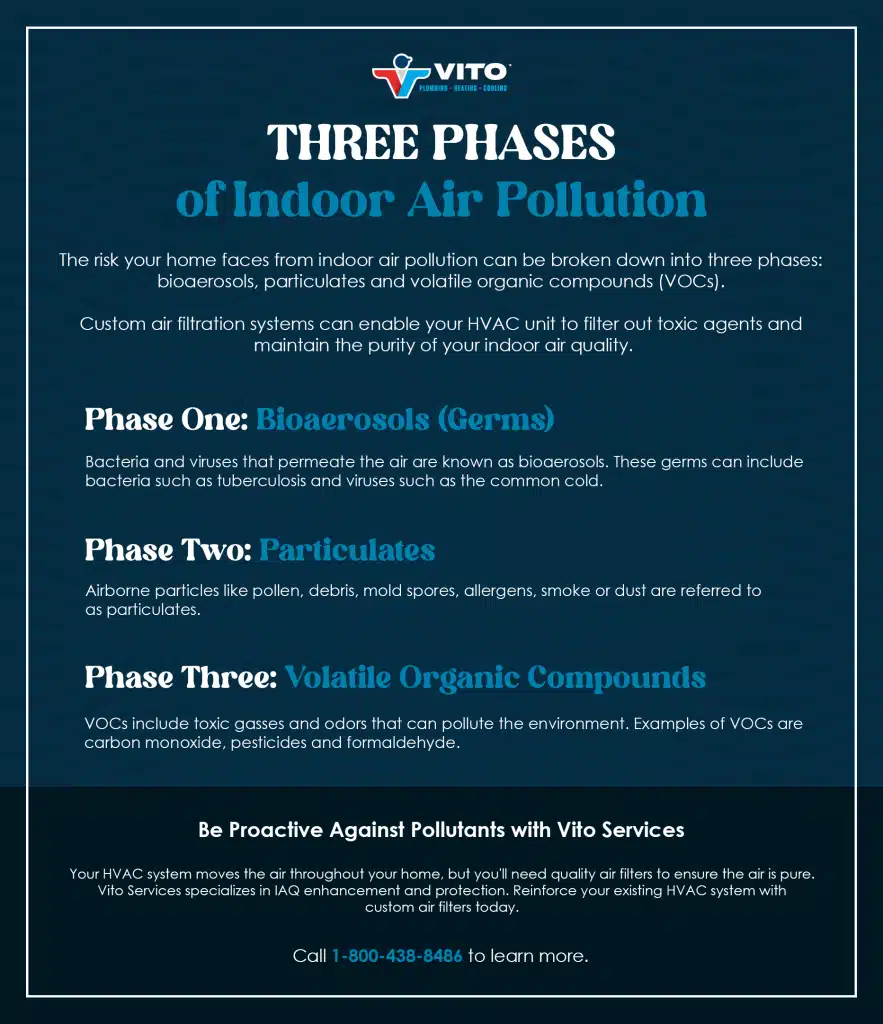
Indoor air pollution is when contaminants within the air are harmful to those breathing them in the environment. Poor air quality can contribute to the development of sickness, infections and in extreme cases the development of severe chronic illnesses (like asthma).
Long-term exposure to indoor air contaminants can cause a variety of health issues. Short-term exposure to reduced indoor air quality can cause respiratory aggravation and symptoms of illness and allergies to increase in household members.
Examples of air pollution include:
- Tobacco smoke
- Carbon dioxide
- Pet dander
- Floating dirt
- Mold or mold spores
- Pollen
- Household chemicals and pesticides
Fortunately, there are ways to prevent indoor air pollution, and several upgrades in air filtration systems can help limit the amount of exposure people have to harmful air contaminants.
COMMON CAUSES OF INDOOR AIR POLLUTANTS
Indoor air pollutants are so common that it is imperative to have a preventative strategy to deal with them. The effectiveness of your air filtration and HVAC system is your main line of defense against indoor air pollution.
COMMON INDOOR AIR POLLUTANTS
- Bacteria can grow in unclean environments, such as the areas of your home that are difficult to reach, like behind the stove or underneath the refrigerator.
- Moist environments culture mold and fungi, which may release contaminant spores into the air.
- VOCs can be found in detergents, paints, perfumes, air fresheners, polishes and other household cleaning products.
- Emissions from fireplaces, stoves and other household appliances can add gasses into the air, like carbon monoxide.
- Cigarettes can create a haze of toxic fumes that compromise your indoor air quality.
One of the most significant risks of indoor air pollutants is that they are unseen. They can build up in the environment and cause illness over time, and symptoms may not show until it's too late.
THREE PHASES OF INDOOR AIR POLLUTION
The common causes of indoor air pollution can be broken down into three phases:
- Bioaerosols: Bioaerosols are germs. These include the airflow transfer of bacteria, fungi and viruses. Bioaerosols present a risk to your immune system. After long periods of exposure, you may begin to show symptoms of infection or illness.
- Particulates: Particulates can include matter small enough to be transferred through the air. These include mold spores, mildew, smoke, pollen and dust. Particulates are often hidden from the eye and may not be identified without proper HVAC filter inspections. Change your filters often (at least once every three months during high-use seasons) to ensure air purity.
- Volatile Organic Compounds: Volatile organic compounds, also known as VOCs, are gases and toxins that enter the air in a variety of ways. You may be exposed to VOCs through household cleaning products, off-gassing from fresh paint and other renovation processes. VOCs can include potentially carcinogenic materials such as formaldehyde, so it is incredibly important to limit VOC filtration within your home.

PREVENTING INDOOR AIR POLLUTION
Our recommendations for managing indoor air quality include investing in air filtration systems to support your environment and taking precautions when using chemicals within your home.
UVC IRRADIATION
For additional HVAC support, you can install a UVC irradiation whole home air filtration system. These are air purifiers that use ultraviolet light rays to sterilize and neutralize pollutants passing through your air ducts.
INCREASE VENTILATION WHEN DEALING WITH VOCS
If you decide to undertake a home renovation project or are using an increased amount of chemical household products, ensure that you increase the ventilation of your home. Open windows and doors to allow the house to air out fully so the VOCs don't recirculate through your ductwork.
SCHEDULE REGULAR HVAC SERVICES
Cleaning the filters and ensuring that no parts are clogged or malfunctioning ensures that it works at optimal efficiency and effectively controls airflow. Contaminants have the potential to build up in dirty filters or ductwork, so this is an easy and effective way to prevent them from becoming an issue.
BALANCE MOISTURE LEVELS IN YOUR ENVIRONMENT
Mold and mildew flourish in damp environments. Your environment may unintentionally be moist due to humid weather or unbalanced moisture levels in your home. Consider investing in a humidifier to help balance the moisture levels in your home and ensure that it is regularly cleaned and detoxed to keep your environment fresh.
KEEP THE AIR IN YOUR ROCKVILLE OR D.C.-AREA HOME SAFE WITH CUTTING-EDGE IAQ SOLUTIONS FROM VITO SERVICES
Reinforce the purity of the air in your environment with effective air filtration systems to ensure that you and your family's health isn't negatively impacted by indoor air pollution. Contact your local Vito Services team by calling 301-315-6100 .








